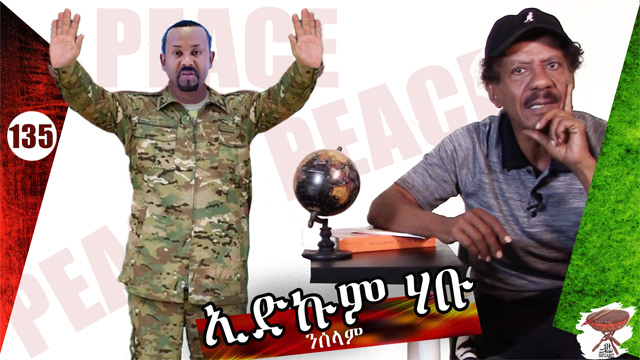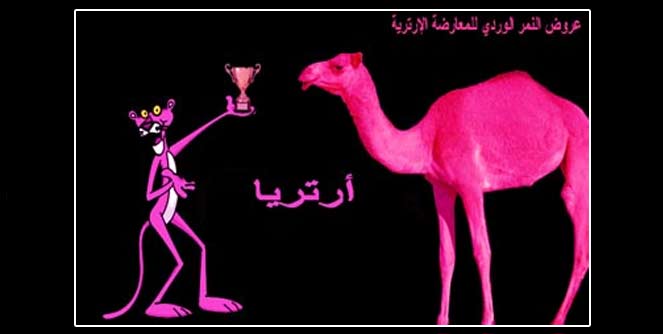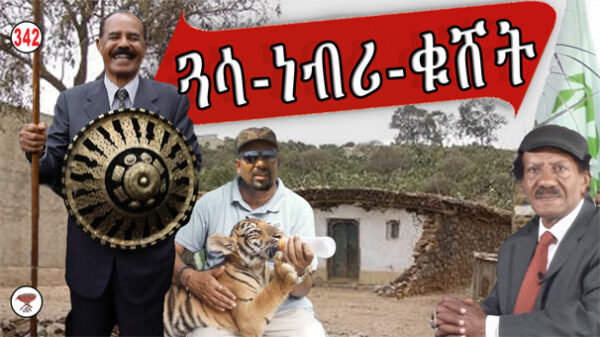Surrender To Peace
In Germany a friend surrendered to the German police:
A long time I go when visiting Germany, I heard a joke of a struggle era veteran who wanted to apply for asylum there. His friends showed him the nearest police station and told him to just surrender there. The veteran, a tall man, walked to the station where the officers were leisurely relaxing in the outside. He slipped his hand in his pocket. The police suspected something bad would happen and dispersed in fear. But our friend pulled his passport from his pocket and threw it in front of them and raised his hand in surrender. The concept of surrendering as a soldier and applying for an asylum is tricky and it one similar word for both. He picked the only type of surrender that he knows…
I remembered that anecdote watching an Ethiopian POW; she was telling a story about how she and her colleagues did not get training on how to surrender.
Anecdotes from my experiences with the PFDJ
I grew up in Keren where there are verities of food grains known as Mashela. The most expensive of the mashela grains is Aklemoy, a white grain. I always wondered about the origin of the naming but then I found it was so obvious; I shouldn’t have. The name of Aklemoy is derived from grain + water: Ekhle Mai (Tigrinya) Ekelna w’Maayna (Tigrayit), and Aklena we moyetna (Arabic). Aklemoy means food-and-water, the elements of sustenance. May you give us our Ekhle-Mai” is a common prayer – give us our grain and water.
But the king of the grain is millet (Beltug) a major stable grain around Keren and other parts of Eritrea. It’s yellow ; millet bread (Kitcha) or porridge (Gaat, ekklet) are yellow, a natural food coloring. If you have not tasted a Beltug bread or porridge, you are missing a major experience. And that’s why I prefer beltug, good for Gaat. Aklemoy is the preferred grain for injera, but all other Mshela verities are used, including wedaker, the lowest quality mashela.
Experience I: Sernay! (Wheat)
A short time after the independence of Eritrea, I met a guy I knew growing up while strolling in Asmara., I would ask him how he was doing and how life was and he replied, “Sernay!” to every question. I found out it was a new expression meaning as white as wheat, meaning, “I am fine.” Sernay? I don’t think that guy ever ate sernay, he must have been raised on millet if not wedaker. But the more I heard that reply, the more it annoyed me because it was alien to my ears. And among the veterans it was a common expression.
Observation 2: Y’all
In the last few months, the “y’all” expression has been spreading so fast among Eritreans and it annoyed me just like “Sernay.” I found out that Tiffany Haddis popularized it because she uses it excessively. The expression spread among Eritreans particularly in Tweeterland. It is like hammering propaganda repeatedly and people have no other choice but to adopt it. It annoys me.
I also found out that “In the Southern United States, people use y’all when addressing two or more people. Y’all is an informal way of saying ‘you all.’” I wondered if “thee” would be less annoying. But thanks to Tiffany, it has become a fad even highly educated people are adopting it. Maybe we can adopt, “I went to y’all’s home, yous were not there… and Isaias is y’all’s president…. (I will get back to Tiffany towards the end)
Observation 3: Who has the right to go to Eritrea?
In 1991, I decided to travel to Eritrea (long story for another time) and a friend told me a woman we both know asked him how “Saleh is doing?” and when he told her I was preparing to travel to Eritrea in surprise she asked, “how come, he is not even a member of the EPLF mass organizations?” If you are not a loyalist of the ruling party your travelling to Eritrea is a shock to the loyalists…. And you can tell where that view has brought us to!
Observation 4:
On my way to Eritrea, I travelled to Cairo and then to Addis Ababa and Mekele. From there, on a million years old Landrover car to the Ethiopian Eritrean border post at Zalambessa. A young thin EPLF combatant imitating an immigration officer asked me where my place of origin was. I told him my grandfather, my father and myself were born in Keren. He insisted on the village of origin before all of that. He went nativist and I didn’t want to play that game with him. As we were having a heated argument, a senior commander who knew me showed in the station and saved the day. I think I explained that in one of the Negarit episodes but there is more to it and hopefully I will tell in the future.
Observation 5:
In Asmara I stayed at the Embasoira Hotel. There I was sitting at the lobby where a pompous guy walked in and sat on a sofa. Back then one could easily tell if someone is local or from abroad, fresh looking, mostly well fed, and often arrogant. Now it is different because China supplied the same affordable clothes to the whole world.
The man asked me where I came from, and he sneered when I told him Kuwait. I asked him and he raised his head proudly and said, “I am American.” Then he asked me if I was a member of the mass organizations of the EPLF. He was disappointed and showed apprehensiveness when I told him I have never been one. He also said a few foolish things that I would rather save you from hearing them
The moment was saved by the late Girma Asmerom who walked into the lobby and they both hugged. Girma oversaw protocol, and he was always at the Ambassoira lobby where he had a small office. Girma joined us at the table and the guy with the inflated chest started to talk like an authority asking Girma, “why is asmera looking so dusty? We have to bring lots of paint and paint all the buildings and make our city clean and shining.” Girma encouraged him, “when we have true patriots like you, reconstruction will be easy.” But when the guy exaggerated his wishes, Girma stopped him, “it’s good to have wishes but we do not even know who owns those buildings let alone to paint them…it requires time…”
Observation 6:
I met Girma in Addis Ababa a few years before he died and I reminded him of that incident. He was reserved and just smiled nervously; I think he didn’t want to be seen with me in public. But I assured him, “we met by accident, and I am not going to mention this…let’s just consider it a meeting between two compatriots, leave politics aside and you know my record on keeping secrets…” He embarrassed me with detailed information on everything awate.com criticized him and we parted hoping to meet again. We never did. He died.
Experience 7
After a month or so, I returned to Kuwait where most of the Eritreans in the community were nostalgic but could not travel to Eritrea for logistical, political and immigration matter. While in Asmara, I went to an electronic shop by the central post office and bough 3 tapes showing the celebrations during the independence days. The community was so happy, and people watched the tapes for two nights. I visited the center on the third day and the television was off. I asked where my tapes were and if they got bored? I discovered the lady in charge of the center decided not to show the tapes. I met and asked her, and she told me her administrators told her to copy the tapes and sell them instead. I objected but she told me it’s a decision by the higher authorities (they had one such authority in Abu Dhabi). I pleaded to get my tapes back, but she said they were confiscated by the higher authority (laElewai akal).
Experience 8:
A few days later a woman who worked as a maid was having an argument with the lady in charge of the center. She had given all the members letters to their bosses asking for donations for Eritrea. The poor woman told the manager her boss already paid a donation to a charity group and showed her a copy of the receipt that her boss gave her. The manager was infuriated, “this receipt is written in Arabic!” Then she looked at me, “read the receipt for me.” It is always an order. I can’t remember the exact amount, but the receipt was for a good amount of money, and it was paid to a Kuwaiti charity group working in the refugee camps in Sudan. She snatched the receipt from my hand and told the lady, tell your boss we do not know them… and no donation should be made to Eritrea except through this office; this is where it is centralized. I tried to explain that no one controls all charities, and she has no control over the Kuwait donor. She burst, “what is they are Jihadi?” I gave up.
Experience 9:
Once my mother was in Mecca performing Haj and I wanted her to come to Kuwait and stay with my family for a few weeks. But to get her a visa, I needed a testimony that she was my mother. I went to the “office” that was promoted to a sort of a consulate. The PFDJ had appointed two ex-ELF and PLF colleagues I knew to run it. I asked the two people in charge for a letter proving that my mother was my mother!
The ELF colleague was adamant and didn’t seem to want to give me any testimony paper. I had just authored a book which was considered blasphemous by the PFDJ. And the old friend, though he didn’t read it, was told so by the supporters of the PFDJ (who manage him behind the curtains). He lectured me on what I should write and not write. A helpless debate ensued, and I told him I cannot discuss with him something he didn’t read, and I was willing to debate those who told him if he wishes. That did it and he said I cannot get any cooperation before I align myself with the new situation in Eritrea but promised to escalate my case to the “higher authority” to see if they would approve giving me a letter, to prove my mother was my mother! It ended there. But here is a sample poem that appeared in the book…
Problem 10
A Limb and A Dagger
A dying limb
Clenching a dagger
Aiming at the soft back
To pierce from behind
To kill the laughter.
Man must cry in agony
And submit to torture…
Pains in the law of the land,
It’s steel chain of the rule
Around ankles and wrists of so many
Just men do not go to the wild
Where they belong and should live
They won’t give up the life of the city
Yet they bring the jungle here
Where all are, comfortably jailed!
One is to live this life
Its fate and destiny…
So they say, order and tell
You should not hold a pen
But “grab a knife, go out and kill”
I was banned from using my pen
Because it only drips light ink
They forced me to use a dagger
Knowing it will drip heavy blood
Never meant to dry out
My fate…
My fate I despise
And myself
I am forced to lick bloody wounds
Like a wolf
And chew bones as I go
Summary:
What I narrated above are some of my encounters and experiences, revelations of hypocrisy, arrogance, totalitarian and primordial mentality, and bureaucracy that I faced. That is on top of the PFDJ’s obsession with centralism even at the expense denying the country the opportunity to receive help from the cooperation of national and foreign doners. That was fast eroding the goodwill I forced myself into and it was the beginning of my determined rebellion against the PFDJ. In short, though I can tell you many more such experiences, I think that would do for today.
Observation 11: Tiffany Haddish
Let me ask y’all: why do you disapprove of Tiffany Haddish’s actions? What has she done to the struggle?
Let’s consider she is a new convert to PFDJism, and as a show person, she would not ignore a promotional opportunity when she sees one. Standing with a president of a country is an excellent sales aid—how many can boast of a picture taken with Abi Arghen, hunh? To us he is a tormentor, a tyrant and a dictator. But not to that extent to the rest of the world. I need concrete reason why y’all hate her and why the NNNN(*1) love her?
These are similar to the question posed to me by well-educated and conscious persons born and raised outside Eritrea, mainly in the USA. My explanation didn’t convince them enough and they challenged me “show use the proof that she promoted the PFDJ injustice!”
See! I need you to help me articulate why many hate her. And please, do it in a convincing, rational, and concrete manner. This doesn’t mean I do not have an opinion, but I want to have as many views as possible. Maybe I can do an episode on similar phenomena as that of Tiffany Haddish.
However, my only answer was that I see her similar like Abiy Ahmed. I care less about what they do in their own countries, but if they promote a system that is oppressing Eritreans (and many are fighting against), it becomes my problem. If anyone wants to appear as a benevolent and caring person while at the same time ignoring the plight of Eritreans, I have a serious problem. Simply put, they are allies of the Eritrean oppressor and that is enough to arouse my wrath. What do you think?
note: NNNN is short for The Tigrinya Nhna Nsu Nsu Nhna, meaning, We are Him and He is Us, meaning Isaias and it’s the slogan of he supporters of the Eritrean ruling regime.




Awate Forum